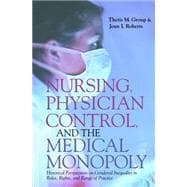
Note: Supplemental materials are not guaranteed with Rental or Used book purchases.
Purchase Benefits
What is included with this book?
Thetis M. Group is Professor Emerita at Syracuse University, where she was Dean of the College of Nursing for ten years. She is also adjunct faculty member at the University of Utah College of Nursing. She is co-author of Feminism and Nursing and has published numerous articles in professional nursing journals.
Joan I. Roberts, social psychologist, is Professor Emerita at Syracuse University. A pioneer in Women's Studies in higher education, she is co-author of Feminism and Nursing and author of numerous books and articles on gender issues and racial and sex discrimination.
| Acknowledgments | ix | ||||
| General Introduction | xiii | ||||
| Nursing, Physician Control, and the Medical Monopoly: An Overview | xxxiii | ||||
| PART I. ``Exposing the Meretricious Lies'': Early Women Healers and Nurses and the Mythology of Medicine's ``Natural'' Supremacy over Healing | |||||
|
3 | (34) | |||
|
37 | (38) | |||
|
75 | (30) | |||
| PART II. The Purposeful Move toward Dominance: Subordinating Nurses and Achieving a Medical Monopoly | |||||
|
105 | (42) | |||
|
147 | (27) | |||
|
174 | (28) | |||
|
202 | (71) | |||
| PART III. An Outdated, Burdensome Model of Monopolistic Control: Entering the Twenty-First Century with a Fractured Health-Care System and Continuing Medical Opposition to Nurses' Autonomy | |||||
|
273 | (50) | |||
|
323 | (73) | |||
|
396 | (81) | |||
| References | 477 | (30) | |||
| Index | 507 |
The New copy of this book will include any supplemental materials advertised. Please check the title of the book to determine if it should include any access cards, study guides, lab manuals, CDs, etc.
The Used, Rental and eBook copies of this book are not guaranteed to include any supplemental materials. Typically, only the book itself is included. This is true even if the title states it includes any access cards, study guides, lab manuals, CDs, etc.